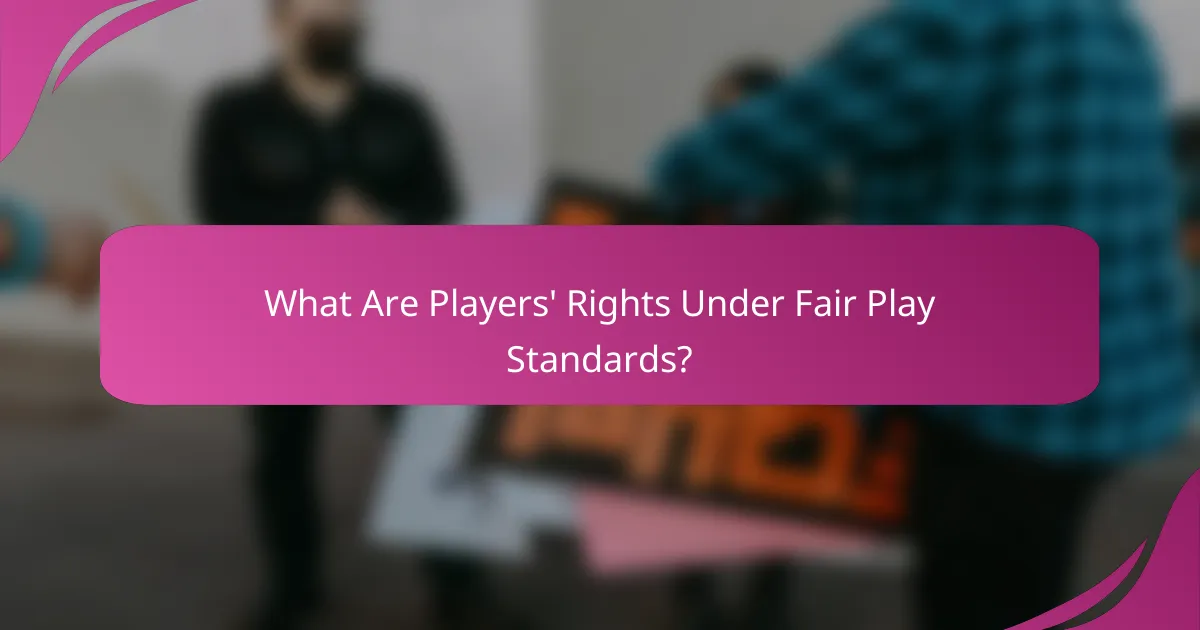Fair play standards in sports are essential for ensuring that competitions are conducted with integrity, respect, and equality among players. These standards are enforced through regulatory bodies and monitoring mechanisms that uphold player behavior and competition rules. Additionally, players’ rights under these standards provide crucial protections, fostering a safe and equitable environment within the sporting community.

What Are the Key Fair Play Standards in Sports?
Key fair play standards in sports ensure that competitions are conducted fairly, promoting integrity, respect, and equality among players. These standards encompass various regulations and guidelines that govern player behavior, competition rules, and organizational practices.
International Fair Play Charter
The International Fair Play Charter serves as a foundational document promoting fair play principles globally. It emphasizes values such as respect, sportsmanship, and ethical conduct in all sports activities. Organizations and federations are encouraged to adopt these principles to foster a culture of fairness.
By adhering to the Charter, sports entities can enhance their reputation and encourage positive behavior among athletes and fans alike. This commitment to fair play can lead to improved relationships within the sports community and increased public trust.
National Regulations
National regulations on fair play vary by country but generally align with international standards. These regulations often include specific rules governing player conduct, competition integrity, and the responsibilities of sports organizations. For instance, many countries have established national sports bodies that enforce these regulations.
Compliance with national regulations is crucial for athletes and organizations to avoid penalties, including fines or suspensions. Understanding the specific requirements in your country can help ensure adherence and promote a fair sporting environment.
Sport-Specific Guidelines
Sport-specific guidelines are tailored to the unique aspects of each sport, addressing specific behaviors and practices that promote fair competition. These guidelines often include rules on equipment, playing conditions, and conduct during competitions. For example, football has strict rules regarding player conduct and sportsmanship during matches.
Adhering to these guidelines is essential for athletes to maintain fairness and integrity in their sport. Familiarizing oneself with the specific rules of the sport can help prevent violations and enhance the overall competitive experience.
Player Conduct Codes
Player conduct codes outline expected behaviors for athletes during competitions and training. These codes typically emphasize respect for opponents, officials, and the game itself. Violations of conduct codes can lead to disciplinary actions, including suspensions or fines.
Players should familiarize themselves with their sport’s conduct code to understand the consequences of their actions. Maintaining professionalism and respect on and off the field is crucial for fostering a positive sports culture.
Anti-Doping Policies
Anti-doping policies are critical components of fair play standards, aimed at ensuring a level playing field by prohibiting performance-enhancing substances. These policies are enforced by national and international sports organizations, which conduct regular testing and impose penalties for violations.
Athletes must be aware of the substances banned in their sport and the testing procedures in place. Understanding these policies not only helps in compliance but also promotes a culture of integrity and fairness in sports.

How Is Fair Play Enforced in Professional Sports?
Fair play in professional sports is enforced through a combination of regulatory bodies, monitoring mechanisms, and disciplinary actions. These systems ensure that players adhere to established standards, promoting integrity and fairness in competition.
Regulatory Bodies
Regulatory bodies play a crucial role in enforcing fair play by establishing rules and guidelines for various sports. Organizations such as FIFA for soccer, the International Olympic Committee (IOC), and the National Football League (NFL) set the standards that athletes must follow. These bodies often collaborate with national federations to ensure compliance at all levels.
In addition to rule-setting, these organizations conduct regular reviews and updates to their regulations, adapting to new challenges such as technology use and doping. Their authority allows them to impose sanctions on players and teams that violate fair play principles.
Monitoring and Compliance Mechanisms
Monitoring mechanisms are essential for ensuring adherence to fair play standards. This includes video technology, such as VAR (Video Assistant Referee) in soccer, which helps officials make accurate decisions during games. Additionally, real-time data analytics are increasingly used to track player behavior and performance.
Compliance is further supported by regular audits and assessments conducted by regulatory bodies. These evaluations help identify potential issues and ensure that teams and players are following the established rules.
Disciplinary Actions
Disciplinary actions are taken against players and teams that breach fair play standards. Common penalties include fines, suspensions, and even lifetime bans for severe offenses. The severity of the punishment often correlates with the nature of the violation, such as doping or match-fixing.
Players are typically informed of the consequences of their actions through clear communication from regulatory bodies. This transparency helps maintain a culture of accountability within professional sports.
Case Studies of Enforcement
Case studies illustrate the enforcement of fair play in action. For example, in 2015, FIFA faced significant scrutiny over corruption allegations, leading to the indictment of several officials and a complete overhaul of its governance structure. This case highlighted the importance of accountability at the highest levels of sport.
Another notable instance is the suspension of athletes for doping violations, such as Lance Armstrong in cycling. His case demonstrated the lengths to which regulatory bodies will go to uphold fair play, ultimately resulting in a lifetime ban and the stripping of titles.

What Are Players’ Rights Under Fair Play Standards?
Players’ rights under fair play standards encompass a range of protections that ensure equitable treatment, safety, and privacy within sports. These rights are designed to foster a positive environment for athletes, promoting integrity and respect in all aspects of competition.
Right to Fair Treatment
The right to fair treatment guarantees that all players are treated equally, without discrimination based on race, gender, or other personal characteristics. This includes equitable access to resources, opportunities, and support from coaches and organizations.
Players should be aware of their rights and report any instances of unfair treatment to relevant authorities or governing bodies. Familiarizing oneself with the specific policies of their sport can help athletes advocate for themselves effectively.
Right to Appeal Decisions
Players have the right to appeal decisions made by officials or governing bodies that they believe are unjust. This process typically involves submitting a formal request for review, which should be outlined in the sport’s governing rules.
Understanding the appeal process is crucial for athletes. They should keep records of incidents and decisions, as this documentation can support their case during an appeal. Timeliness is also important, as there are often strict deadlines for submitting appeals.
Right to Safe Playing Conditions
The right to safe playing conditions ensures that athletes compete in environments that prioritize their health and safety. This includes proper facilities, equipment, and adherence to safety regulations.
Players should regularly assess their playing conditions and report any hazards to their coaches or governing bodies. Awareness of safety protocols and emergency procedures can significantly reduce risks during competitions.
Right to Privacy
The right to privacy protects players’ personal information and ensures that their data is handled responsibly. This includes safeguarding medical records, performance data, and personal details from unauthorized access or disclosure.
Athletes should be informed about how their data is collected and used, and they should have the option to consent or opt-out where applicable. Understanding privacy policies can empower players to take control of their personal information in the sports context.

What Are the Challenges in Enforcing Fair Play?
Enforcing fair play in sports faces several significant challenges, including corruption, lack of awareness, and inconsistent regulations across different regions. These issues undermine the integrity of competitions and can lead to a decline in trust among players and fans alike.
Corruption and Match-Fixing
Corruption and match-fixing are major threats to fair play, often driven by financial incentives. Players, officials, or even team management may engage in unethical practices to manipulate game outcomes for personal gain.
To combat this, sports organizations must implement strict monitoring systems and establish clear penalties for those caught engaging in such activities. Transparency in financial dealings and regular audits can also help deter corruption.
Lack of Awareness Among Players
Many players may not fully understand the rules and regulations surrounding fair play, leading to unintentional violations. This lack of awareness can stem from insufficient education and training programs within teams and leagues.
To address this, organizations should prioritize educational initiatives that inform players about their rights and responsibilities regarding fair play. Regular workshops and accessible resources can enhance understanding and compliance.
Inconsistent Enforcement Across Regions
Enforcement of fair play standards varies significantly across different regions, creating disparities in how rules are applied. Some countries may have robust regulations, while others lack the necessary frameworks to ensure compliance.
To improve consistency, international sports bodies should work towards harmonizing regulations and enforcement practices. Establishing a unified code of conduct and providing support for less developed regions can help create a more level playing field.

How Do Different Countries Approach Fair Play?
Countries vary significantly in their approach to fair play, influenced by cultural, legal, and economic factors. These differences shape how regulations are enforced and how player rights are protected across various regions.
United States Regulations
In the United States, fair play is primarily governed by federal and state laws, alongside regulations from sports organizations. The Professional and Amateur Sports Protection Act (PASPA) and various anti-discrimination laws play key roles in ensuring fair treatment of players.
Sports leagues like the NFL and NBA have their own codes of conduct that promote fair play and outline penalties for violations. Players are encouraged to report misconduct, and whistleblower protections are often in place to safeguard their rights.
European Union Standards
The European Union emphasizes fair play through a combination of regulations and directives aimed at protecting athletes’ rights. The EU’s Charter of Fundamental Rights includes provisions that support non-discrimination and fair treatment in sports.
Additionally, the UEFA and other governing bodies enforce strict compliance with fair play standards, including financial fair play regulations that ensure clubs operate within their means. This promotes a level playing field and protects players from exploitative practices.
Asia-Pacific Initiatives
In the Asia-Pacific region, fair play initiatives vary widely, with countries like Australia adopting comprehensive frameworks to promote integrity in sports. The Australian Sports Anti-Doping Authority (ASADA) enforces standards that ensure fair competition and athlete rights.
Other countries, such as Japan and South Korea, are increasingly focusing on fair play through national sports policies that include educational programs for athletes. These initiatives aim to foster a culture of respect and integrity within sports, addressing issues like match-fixing and doping.
